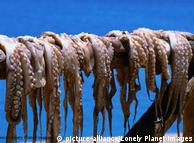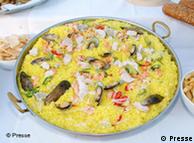前輩詩人張默於7月1日接獲韓國駐台代表具良根電話,轉達其師、鑽研中國文學的韓國詩人許世旭(1934-2010)當日中 午病逝於高麗大學醫院的消息。
許世旭畢業於韓國外語大學中文系,留學寶島,取得台灣師範大學國文研究所碩、博士學位,回國後於韓國外語大學中文系、韓國高麗大學中文系任教,並任美國柏 克萊大學、中國復旦大學、西南師大、西北大學之講座。所著《新詩論》(三民)探討台灣與大陸的新詩發展,評論鞭辟入裡,文字精練優美。許世旭與台灣詩運關 係密切,曾與紀弦、鄭愁予和楚戈並稱詩壇四大飲者。
For weeks during the World Cup, long lines formed in front of the Sea Life Aquarium in Oberhausen despite the summer heat, with people waiting patiently to enter the park.
An uninformed observer might think, 'Why don't they just head to the nearest swimming pool in this weather?' The answer: This is where Paul lives. And Paul is an attraction.
Paul is a two-and-a-half-year-old octopus. He has eight arms, nine brains and three hearts. An animal with such 'interior values' might after all really have soothsaying qualities. Two years ago, during the European Football Championship, Paul gave the first samples of his abilities as an oracle.
How does he do it?
 Bildunterschrift: Großansicht des Bildes mit der Bildunterschrift: Paul correctly picked the winner of all of Germany's matches
Bildunterschrift: Großansicht des Bildes mit der Bildunterschrift: Paul correctly picked the winner of all of Germany's matches
Paul loves mussels. During the 2008 tournament, someone came up with the idea to take two glass containers, drape each with the flag of one of the competing teams, and place a mussel inside.
Enter Paul the octopus, who would hover over the boxes, choose one of the mussels and fish it out - thus predicting which team would win that particular match. Sounds easy, but it isn't.
The aquarium followed the same procedure this year during the World Cup, and Paul was right every time. People wondered how he did it, and turned to scientists. As it turns out, there are plenty of answers, not all of them scientific.
Favorite color or sense of smell?
One explanation: the color combination. Maybe Paul the oracle likes red-yellow. Both the Spanish and the German flag sport these colors. Maybe that's why he made the wrong choice back in the 2008 finals, when he predicted Germany would win. He never made that mistake again.
Are his other correct predictions due to the fact that neither England (red-white) nor Argentina and Uruguay (blue-white) have the right color combination in their flags? But why then did Paul choose the Serbian box (blue-red-white) over the German one in the second group stage match?
A second explanation might help solve that dilemma: the octopus has an excellent sense of smell. Sea Life is adamant that both mussels came from the same source and were of identical quality, and that may very well be true from a human perspective.
But it's possible that the octopus with the sensitive nose went for the better mussel. But even in this case, the prediction's concurrence with the actual outcome of the match leaves too much room for coincidence.
 Bildunterschrift: Many a German wished this fate on Paul
Bildunterschrift: Many a German wished this fate on Paul
Bodyguards for an octopus
Be that as it may, Paul has gained worldwide fame. And like every other star, he doesn't only have fans.
Threats from disappointed German and Dutch soccer fans can be found on the Internet under "Octopus Paul, we know where your tank is." The Internet was swamped by octopus recipes and pictures of octopuses hung out to dry. A video on YouTube showed brutal scenes from Chinese restaurants, where live octopuses were tossed into a boiling liquid.
But none of that really matters to cuddly Paul in his Oberhausen aquarium. Sea Life arranged for 24 hour 'security' for the animal, successfully fending off any cowardly attacks.
Retired octopus
Now that the World Cup is over, the hoopla has died down somewhat. Which is a good thing. After all, Paul is two-and-a-half years old, a respectable age for an octopus. He needs his rest.
As a matter of fact, Paul might not be around much longer. While Sea Life wants to make sure he is content until he dies, Paul's fans don't want him to retire. The aquarium receives hundreds of emails every day with oracle questions for the mollusk.
Questions like: "How long will Merkel's coalition last?" or "Am I going to get a D in math this year?" are fun, but Paul, according to scientific expertise, can't answer them. So, in the end, the soothsaying octopus can peacefully swim through his tank toward that eternal resting place under water.
Spain misses out
 Bildunterschrift: Großansicht des Bildes mit der Bildunterschrift: Paella is not to be the famous oracle's fate after all
Bildunterschrift: Großansicht des Bildes mit der Bildunterschrift: Paella is not to be the famous oracle's fate after all
A generous offer from Spain is not likely to change his fate. A village in the northwestern part of the country has collected money and would like to buy Paul for 30,000 euros ($37,720). They want him to perform, though not as an oracle but as a mascot for a food festival with plenty of octopus specialties on the menu. Evil be to him who evil thinks...
But Sea Life in Oberhausen won't be swayed by the tempting offer. Oberhausen is where Paul will stay, where it's clear this octopus is not going to end up in a paella.
Author: Silke Wuensch/db
Editor: Martin Kuebler
| 楊德豫:人鬼龍蛇八 十秋(圖) |
| 中國網 china.com.cn 時間: 2009-06-29 |
|
【人物名片】 楊德豫,翻譯家,1928年12月12日生,其父為國學大師楊樹達。歷任湖南人民出版社和湖南文藝出版社編輯。五卷本《楊德豫譯詩集》由廣西師 範大學出版社出版。 日前,《楊德豫譯詩集》由廣西師範大學出版社出版。作為一名優秀的編輯,由楊德豫主編的“詩苑譯林”在上世紀曾經產生過重要影響,作為一名優秀 的翻譯家,楊德豫的英詩翻譯深受好評並獲翻譯大獎。楊德豫先生一向低調,生平經歷及事跡很少見於報章及網路。5月,記者專赴長沙,聽這位年過八旬的老人追 憶父親及他自己坎坷的人生。 追憶父親 苛刻嚴厲 父愛深沉 小時候,我的興趣本來是美術,喜歡畫畫。當時,我父親楊樹達是清華大學中文系的教授,他主要是搞語言文字學,研究《漢書》、《春秋》、《論語》 等等。他把我的興趣向詩歌引導,從小就教我念《詩歌易讀》、《唐詩易讀》、《唐詩三百首》等等。 1938年的時候,小學課本全部是白話文。我父親不大喜歡白話文,他就買了一種民國初年出版的全部是文言文的初中語文課本,一課一課教我,所以 我文言文的基礎從那時候打下來。 1945年7月,高考。我當時好高騖遠,看不起湖南大學,在填志願的時候,我填了西南聯大,我父親不準,一定要我考湖南大學,留在他身邊。我在 父親的命令下,勉強填了湖南大學,我父親要我上中文系或者歷史系。我想,如果上中文系就是我父親的學生了,天天上我父親的課,父親又管得很嚴,就報了歷史 系,這樣離我父親還稍微遠一點。 在湖南大學歷史系就讀的一年裏,我只上兩個人的課,一個是很有名的政治學家李劍農的政治學課程,還有一個是曹廷藩的地理,他的政治思想很進步, 地理教得很好。 1946年的夏天,我下決心去考清華或者中央大學,父親不準我去,一分錢不給,我母親和大姐變賣了首飾支援我去武漢參加考試。後來,我考上了中 央大學外文系。我父親很捨不得我走,但是,他也沒有辦法。我父親很愛我,又對我很嚴厲。我沒有想到,我父親這次和我竟是永別。對此,我一直很後悔,覺得對 不起我父親。 困難遭遇 大鳴大放 被打右派 1956年召開知識分子會議,周恩來做了《向科學進軍》的報告,我的思想開始活動,覺得在部隊裏幹不太合適,我還是喜歡外國文學,想搞翻譯。 1956年秋天,我的業餘詩歌翻譯開始了,開始翻譯的是《朗費羅詩選》和《彭斯詩選》。這時,就有點不安心部隊的工作。 大鳴大放的時候,地方鳴放很熱烈,部隊沒有鳴放,想出氣的人就覺得很憋氣,要求“鳴放”。由我發起,報社的好幾位同事聯名寫了一篇文章,要求 “鳴放”,文章說我們是部隊報紙,廣州軍區領導“壓制鳴放”,把這個稿子投到廣東省委的機關報《南方日報》。可是後來接到《戰士報》社電話,他們說把它撤 了,上面有壓力。這樣,這篇文章就沒有在《南方日報》刊登。 不久,開了一個廣州軍區報刊座談會,一共有二十幾個人參加,會上,我第二個發言。那時我膽子很大,我說:聽《解放軍報》駐廣州的記者說,《解放 軍報》總編輯歐陽文中將說過,如果國防部長壓制鳴放,《解放軍報》也敢批評他。我們《戰士報》就要學《解放軍報》這樣的英雄氣概,如果廣州軍區的領導壓制 鳴放的話,我們《戰士報》也敢點名批評他。 反右開始後,我心裏想在劫難逃了。回來之後,就有人貼我的大字報,我就被劃成右派批判。我被劃右派主要是兩條罪狀,一條是寫那篇沒有發表的文 章,說廣州軍區領導“壓制鳴放”;另一條就是在廣州軍區報刊座談會上發言。1958年右派處理分成六類,第一類是勞動教養。第二類就是監督勞動,就是一個 月只發15塊。我是第五類,降級,降職,降薪。我原來是正連級,相當於地方的19級,降成22級,工資原來是一百零幾塊,加上軍齡補貼一共是120幾塊, 降到50塊。第六類是免予行政處分,不降級。我被取消了預備黨員資格,開除軍籍,剝奪軍銜,被遣送到湖南大通湖農場勞動。在此後20年時間裏,我有13年 半在生產隊第一線,跟農民同吃同住同勞動,可以說是體力勞改。 翻譯風波 右派出書 稿費被扣 1958年6月,我到了農場勞動。1959年10月,我那本《朗費羅詩選》就在人民文學出版社出版了,為什麼我是右派還能出版書呢?這裡有一個 過程。 其實人民文學出版社約我翻譯的有兩本半,除了這本《朗費羅詩選》,還有一本是《彭斯詩選》。我把我的譯稿寄去了,他們說我社已經另約一個人的翻 譯《彭斯詩選》,由你們兩個人合譯。我當時還不知道是誰,後來知道是王佐良。不用我的譯稿之後,後來出版的是王佐良譯的薄薄一本。另外,人民文學出版社還 約我翻譯一位現代澳大利亞詩人的詩選。 《戰士報》社給人民文學出版社的信寄去之後,人民文學出版社回信了,信是這麼寫的:我們同意《彭斯詩選》不用他的譯稿了,澳大利亞詩人的詩,也 作廢了;可是《朗費羅詩選》他已經譯完了,我們再另找一個人要重新譯,很費事,而且上面有政策,右派分子如果要出書的話可以改個名字出,那所以他譯的這本 書我社還是打算出。《戰士報》領導還是不太同意,他們回信說,我們原則還是不同意出,如果你們實在堅持要出的話,一切責任由你們負。這是總編輯直接告訴我 的。我說好,我就換個名字,我的原名是楊德豫,我給人民文學出版社寫信說,用楊德豫的名字出,1959年10月,《朗費羅詩選》就出版了。 出書以後,我在生產隊勞動。這本書稿費是600多元,一分場的書記李信把稿費扣住了,不給我。我就給出版社寫信說我沒收到稿費,後來一查,稿費 確實已經到了農場。我就去問農場領導,我說我有一本書出版了,得了600元稿費,給我匯來,可是沒有收到。1962年初,情況好轉了,要給我摘帽子了,農 場的右派哪怕沒摘帽子的也不在生產隊勞動了,都分到生產隊做會計、統計,或者到學校教書,這時才把這600元錢還給我。 我于1978年12月被調到湖南人民出版社,剛到出版社還是打雜,沒有譯文編輯室。譯文編輯室1979年建立後,我就到譯文室了。湘潭大學教 授、老詩人彭燕郊找到出版局領導,建議出版一套外國詩歌中譯本叢書。1982年10月才把編叢書的任務交給我。“詩苑譯林”先後由湖南人民、湖南文藝兩家 出版社出版,時間長達10年(1983-1992),共出書五十一種。1991年,這套叢書獲首屆全國優秀外國文學圖書二等獎。(采寫、攝影/本報記者 張弘) 【譯作介紹】 《楊德豫譯詩集》 五卷本《楊德豫譯詩集》分別為《莎士比亞 貞女劫》、《華茲華斯詩選》、《柯爾律治詩選》、《拜倫詩選》、《朗費羅詩選》。 莎士比亞是英國著名的戲劇家和詩人,也是歐洲文藝復興時期人文主義文學的集大成者。《貞女劫》是莎士比亞的經典詩歌作品之一;華茲華斯是英國浪 漫主義詩人。1843年被封為英國桂冠詩人。《華茲華斯詩選》收錄了華茲華斯的經典詩歌作品;柯爾律治,詩人,評論家,哲學家。《柯爾律治詩選》收錄了柯 爾律治的經典詩歌作品三十三首;拜倫是英國浪漫主義文學的傑出代表。在他的詩歌裏塑造了一批“拜倫式英雄”,他們孤傲、狂熱、浪漫,卻充滿了反抗精神。 《拜倫詩選》精選了拜倫的主要佳作;朗費羅,19世紀美國最偉大的浪漫主義詩人之一,《朗費羅詩選》收錄了朗費羅的經典詩歌作品。 【編作介紹】 “詩苑譯林”的影響 由楊德豫主編,湖南人民出版社出版的“詩苑譯林”叢書上世紀80年代在文化界享有極高的聲譽,許多詩歌愛好者更是追著出一本買一本。因為主編了 這套書,楊德豫被蕭乾在一篇文章中譽為“長沙出版界四騎士”之一(鐘叔河主編“走向世界叢書”、楊德豫主編《詩苑譯林》、李全安主編《散文譯叢》、曹先捷 主編“世界著名學府叢書”)。而這套書能夠受到讀者的追捧也決非偶然,無論從翻譯品質上還是出版規模上,在當時都是罕見的。 這部叢書中幾乎每一本的譯者都是翻譯界的權威和最優秀的譯者,以下是其中的書目和譯者: 《戴望舒譯詩集》、《梁宗岱譯詩集》、《朱湘譯詩集》、《戈寶權譯詩選》、《德語六詩人選譯》(馮至譯)、《德語國家現代詩選》(綠原譯)、 《英國詩選》(卞之琳譯)、《蘇格蘭詩選》(王佐良譯)、《英國十四行詩抄》(屠岸譯)、《英國現代詩選》(查良錚譯)、《法國七人詩選》(程抱一譯)、 《法國現代詩選》(羅洛譯)、《域外詩抄》(施蟄存譯)、《古希臘抒情詩選》(羅念生、水建馥譯)、《印度古詩選》(金克木譯)、《英國維多利亞時代詩 選》(飛白譯)、《霍斯曼:西羅普郡少年》(周煦良譯)、《圖像與花朵》(陳敬容譯)、《紀伯倫:先知沙與沫》(冰心譯)、《美國當代詩選》(鄭敏譯)、 《北歐現代詩選》(北島譯)…… 【獲獎介紹】 獲詩歌翻譯彩虹獎 楊德豫翻譯的《華茲華斯詩選》由蕭乾、文潔若、孫繩武、綠原、屠岸等名翻譯家聯合推薦,最終獲得1995-1996年全國優秀文學翻譯彩虹獎。 詩人北塔曾經撰文《形神兼備信言美》對楊德豫先生的漢譯《華茲華斯詩選》予以極高評價。 另外,楊德豫翻譯的《拜倫詩選》被老詩人、翻譯家卞之琳譽為“標誌著我國譯詩藝術的成熟;翻譯家屠岸對楊德豫的譯筆給予高度評價,稱傅雷和楊德 豫兩人“都是第一流 |
| Mary P. Follett : Creating Democracy, Transforming Management Tonn, Joan C. Pages: 639 Publisher: Yale University Press Released: 2003 Language: en LC Call Number: HN57 -- .T695 2003eb ISBN: 9780300096217 Dewey Decimal Number: 303.48/4/092 B Subjects: Follett, Mary Parker, -- 1868-1933. Women social reformers -- United States -- Biography. Social reformers -- United States -- Biography. Social structure. Democracy. Management. Psychology, Industrial. Mary Parker FollettFrom Wikipedia, the free encyclopedia Jump to: navigation, search
Mary Parker Follett (3 September 1868 – 18 December 1933) was an American social worker, management consultant and pioneer in the fields of organizational theory and organizational behavior. She also authored a number of books and numerous essays, articles and speeches on democracy, human relations, political philosophy, psychology, organizational behavior and conflict resolution. Along with Lillian Gilbreth, Mary Parker Follett was one of two great women management gurus in the early days of classical management theory.She admonished overmanaging employees, a process now known as micromanaging, as “bossism” and she is regarded by some writers as the “mother” of Scientific Management. As such she was one of the first women ever invited to address the London School of Economics, where she spoke on cutting-edge management issues. She also distinguished herself in the field of management by being sought out by President Theodore Roosevelt as his personal consultant on managing not-for-profit, non-governmental, and voluntary organizations. In her capacity as a management theorist, Mary Parker Follett pioneered the understanding of lateral processes within hierarchical organizations (which recognition led directly to the formation of matrix-style organizations, the first of which was DuPont, in the 1920s), the importance of informal processes within organizations, and the idea of the "authority of expertise"--which really served to modify the typology of authority developed by her German contemporary, Max Weber, who broke authority down into three separate categories: legitimate, traditional and charismatic.[1] Follett was born in Massachusetts and spent much of her early life there. In September 1885 she enrolled in Anna Ticknor's Society to Encourage Studies at Home[2]. In 1898 she graduated from Radcliffe College, but was denied a doctorate at Harvard on the grounds that she was a woman. Over the next three decades, however, she published many works, including:
There is correction in the publishing year of book "Dynamic Administration" it is actually 1st published in 1942 by harper& brothers publisher its a collection of papers of follett which was edited by C.Metcalf and L. Urwick. She recognized the holistic nature of community and advanced the idea of "reciprocal relationships" in understanding the dynamic aspects of the individual in relationship to others. Follett advocated the principle of what she termed "integration," or noncoercive power-sharing based on the use of her concept of "power with" rather than "power over." Her ideas on negotiation, power, and employee participation were highly influential in the development of the fields of organizational studies, alternative dispute resolution, and the Human Relations Movement.[citation needed] She was also a pioneer in the establishment of community centers. Even though most of Mary Parker Follett's writings remained known in very limited circles until republished at the beginning of this decade (beginning with Pauline C. Graham's first-rate work), her ideas gained great influence after Chester Barnard, a New Jersey Bell exec and advisor to President Franklin D. Roosevelt, published his seminal treatment of executive management, The Functions of the Executive[3]. Barnard's work, which stressed the critical role of "soft" factors such as "communication" and "informal processes" in organizations, owed a telling yet undisclosed debt to Follett's thought and writings. In addition, her emphasis on such soft factors paralleled the work of Elton Mayo at Western Electric's Hawthorne Plant, and presaged the rise of the Human Relations Movement, as developed through the work of such figures as Abraham Maslow, Kurt Lewin, Douglas McGregor, Chris Argyris, Dick Beckhard and other breakthrough contributors to the field of Organizational Development or "OD".[4] Her influence can also be seen indirectly perhaps in the work of Ron Lippitt, Ken Benne, Lee Bradford, Edie Seashore and others at the National Training Laboratories in Bethel, New Hampshire, where T-Group methodology was first theorized and developed.[5] Thus, Mary Follett's work set the stage for a generation of effective, progressive changes in management philosophy, style and practice, revolutionizing and humanizing the American workplace, and allowing the fulfillment of Douglas McGregor's management vision--quantum leaps in productivity effected through the humanization of the workplace.[6] [edit] References
"Dynamic Administration: The Collected Papers of Mary Parker Follett: Early Sociology of Management and Organizations", Vol. 3, by Mary Follett, L. Urwick (Editor); Publisher: Taylor & Francis, Inc. November 2003. ISBN 9780415279857 "Mary Parker Follett: Prophet of Management", by Pauline Graham (Editor); Beard Books, Incorporated: December 2003. ISBN 9781587982132
[edit] External links
Mary Parker Follett | |||||||||||||||||||
| Mary Parker Follett (1868-1933) was a visionary and pioneering individual in the field of human relations, democratic organization, and management. Born in Massachusetts, in 1892 she entered what would become Radcliffe College, the women's branch of Harvard. She graduated from Radcliffe summa cum laude in 1898. Follett's intensive research into government while at Radcliffe was later published in her first book, The Speaker of the House of Representatives (1909), which was lauded (by, among others, Theodore Roosevelt) as the best study of this office of government ever done. From 1900 to 1908, Follett devoted herself to social work in the Roxbury neighborhood of Boston. In 1908 she became chairperson of the Women's Municipal League's Committee on Extended Use of School Buildings, and in 1911 she helped open the East Boston High School Social Center. She was instrumental in the formation of many other social centers throughout Boston. Her experience in this area helped to transform her view of democracy. Follett later served as a member of the Massachusetts Minimum Wage Board, and in 1917 she became vice-president of the National Community Center Association. By this time, however, she had turned most of her attention to writing for a wider public regarding what the social centers had taught her about democracy. In 1918 she published her second book, The New State, which is concerned with the human nature of government, democracy, and the role of local community. In 1924, Follett published her third book, Creative Experience. This work addresses more directly the creative interaction of people through an on-going process of circular response. From this point until her death in 1933, Follett found her most enthusiastic audience in the world of business. Admiration and respect for her work grew on both sides of the Atlantic, and she became a leading management consultant. (Peter Drucker, who discovered Follett's work in the 1950's, is said to have referred to Follett as his "guru.") Her various papers and speeches in this context were published in 1942 by Henry Metcalf and Lionel Urwick in a book called Dynamic Administration. Another celebration of her work in this context is Mary Parker Follett: Prophet of Management, which was edited by Pauline Graham and published in 1995. In 1998, The New State was re-issued by Penn State Press, with a preface by Benjamin Barber. A biography of Follett, written by Joan Tonn, a professor at the College of Management, University of Massachusetts, Boston, is expected to be published next year. Follett is increasingly recognized today as the originator, at least in the 20th century, of ideas that are today commonly accepted as "cutting edge" in organizational theory and public administration. These include the idea of seeking "win-win" solutions, community-based solutions, strength in human diversity, situational leadership, and a focus on process. However, just as her ideas were advanced for her own time, and advanced when people wrote about them decades after her death, they remain too often unrealized. We recognize them as an inspirational and guiding ideal for us today, at the beginning of the 21st century. It is the intention and the design of the Foundation's programs to continue the effort to bridge ideal and practice in a continuous process that gives rise to true freedom. | |||||||||||||||||||